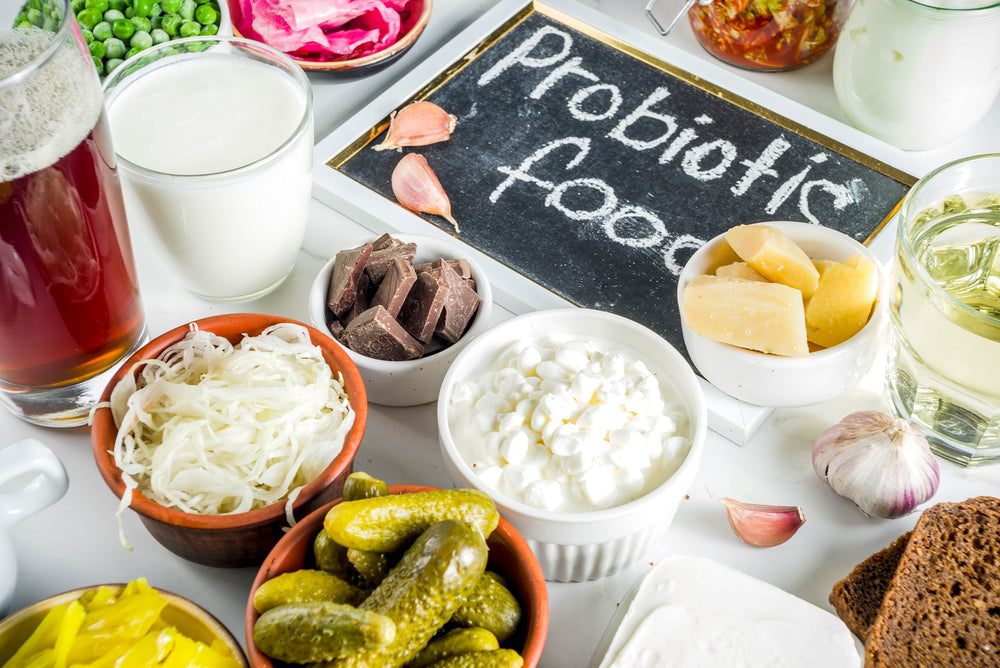Probiotics, according to Cleveland clinic, are a combination of live beneficial bacteria and/or yeasts that naturally live in your body. Bacteria is usually viewed in a negative light as something that makes you sick. However, you have two kinds of bacteria constantly in and on your body — good bacteria and bad bacteria.
Probiotics are made up of good bacteria that helps keep your body healthy and working well. This good bacteria helps you in many ways, including fighting off bad bacteria when you have too much of it, helping you feel better.
FOOD RICH IN PROBIOTICS
Yoghurt
Yoghurt is one of the best sources of probiotics. Probiotic yoghurt is associated with a number of health benefits and may be suitable for people with lactose intolerance. Make sure to choose yogurt that has active or live cultures.
Kefir
Kefir is a fermented milk drink. It is a better source of probiotics than yogurt, and people with lactose intolerance can often drink kefir with no problems.
Sauerkraut
Sauerkraut is finely cut, fermented cabbage. It is rich in vitamins, minerals, and antioxidants. Make sure to choose unpasteurized brands that contain live bacteria.
Tempeh
Tempeh is a fermented soybean product that serves as a popular, high protein substitute for meat. It contains a decent amount of vitamin B12, a nutrient found mainly in animal products.
Kimchi
Kimchi is a spicy Korean side dish, usually made from fermented cabbage. Its lactic acid bacteria may benefit digestive health.
Miso
Miso is a fermented soybean paste and a popular Japanese seasoning. It is rich in several important nutrients and may reduce the risk of cancer and stroke, especially in women.
Kombucha
Kombucha is a fermented tea drink. It is claimed to have a wide range of health benefits, but more research is needed.
Pickles
Pickled are cucumbers that have been preserved in salty water and fermented. They are low in calories and high in vitamin K. However, pickles made using vinegar do not have probiotic effects.
Traditional buttermilk
Traditional buttermilk is a fermented dairy drink mainly consumed in India, Nepal, and Pakistan. Cultured buttermilk, found in American supermarkets, generally does not have any probiotic benefits.
Natto
Natto is a fermented soy product that is a staple in Japanese kitchens. It contains a high amount of vitamin K2, which may help prevent osteoporosis and heart attacks.
Cheese
Only some types of cheese — including cheddar, mozzarella, and gouda — contain probiotics. Cheese is very nutritious and may benefit heart and bone health.
The above food a few of the many sources of probiotics.
Genaral Practitioner (GP) and online doctor for OnlinePrescriptionDoctor, Dr Giuseppe Aragona, explains the benefits of probiotics on men’s health. “One of the best ways to take care of your digestive and overall health is through probiotic supplements,” he says. “Probiotics are beneficial micro-organisms that live in your gut and help to support your physical and mental health. Every person’s gut microbiome has different bacteria so your body’s reaction to probiotics may be different to someone else. However, overall probiotics are beneficial for men’s health, and support wellbeing.”
Below, we’ll delve into each benefit of probiotics for men, and give you an overall idea of why your probiotic needs might be different as a man.
DIGESTIVE HEALTH
A study in the Journal of Neurogastroenterology and Motility(opens in new tab) indicates that there is a direct link between sex hormones and the microbiome. This means that women and men may have differing needs when it comes to probiotic supplementation, as we have different concentrations of different sex hormones. Some strains of probiotics for men may actually be better for you than standard types, or probiotics for women, as they’re tailored to your needs as a man.
Aragona agrees that probiotics make a palpable difference to gut health. “The main benefits of taking probiotics would be replenishment of good bacteria in your gut, reducing digestive disorder symptoms, supporting mental health, boosting the immune system and helping with weight loss.”
MENTAL HEALTH
You may have heard the term ‘gut-brain axis’ and wondered what it means. A study in the Journal of Medicine and Food(opens in new tab) supports growing evidence that there is a direct link between the gut and the brain. The gut microbiome may even have the power to control your food choices, as it uses the nervous system and the vagus nerve to communicate with our brains. There’s a reason the gut is known as the ‘second brain’. With this in mind, a healthy gut microbiome can support good mental health, and an unhealthy gut microbiome can contribute to mental health issues.
Aragona says that probiotics have the power to improve your mood and support better overall mental health. “Probiotics can also boost mood, cognitive function and can help to lower stress and anxiety. They may also prevent the development of mental health issues, such as depression in men,” he says. “However, of course, you cannot rely on probiotics, and if you are suffering with mental health issues you should consult a medical
Another study in the Journal of Autoimmunity(opens in new tab) found that there are gender-specific differences in immunity, further suggesting that tailored probiotics for men might be a better choice. Additionally, the study indicates that our gut microbiome can produce so-called “happy hormones” serotonin and dopamine, illustrating the intrinsic relationship our gut health has with our mental health.
The journal Pharmacology & Therapeutics(opens in new tab) has published research that indicates that probiotics may be a new frontier in therapeutic aids to support mental health and cognitive conditions, such as anxiety, depression, autism spectrum disorders and Parkinson’s disease. It also supports the gender split in probiotic requirements due to the interaction of the microbiome with our sex
PROSTATE HEALTH
As a man, it’s important to care for your prostate, with one in eight men diagnosed with prostate cancer in their lifetime. This goes up to six cases in 10 in men who are 65 or older, with the average age of diagnosis being 66. With this in mind, taking care of your prostate might be of particular concern for men over 50.
There is evidence that probiotics can help to reduce inflammation in the prostate, according to a trial in La Clinica Terapeutica(opens in new tab). The trial found that probiotics reduce the bacterial load of E. coli and E. faecalis in urine cultures, which promotes better prostate health and can help prevent swelling of the prostate (prostatitis) which can lead to further
TESTOSTERONE
Nutritionist Jenny Tschiesche, of sugar-free and vegan vitamin brand Nutriburst(opens in new tab), tells LiveScience about the effects that probiotics can have on testosterone levels. “The stress hormone cortisol suppresses testosterone, and it has been proven in studies that probiotics can reduce cortisol levels therefore increasing testosterone levels,” she says
WEIGHT MANAGEMENT
Aragona says that after the ‘male menopause’, where testosterone levels drop off, some men see an uptick in their weight. “Probiotics can also help men to manage their weight. Aging and hormonal change can contribute to weight gain in men, especially when testosterone levels drop,” he says. “Probiotic strains such as bifidobacterium lactis can help with any unwanted weight gain and promote healthy weight loss.”
A study in Current Obesity Reports(opens in new tab) supports this point, indicating the beneficial effects on weight reduction and other metabolic parameters via probiotic involvement in gut microbiota modulation. In short, a healthy gut microbiome can help you keep the pounds off, although the study states that more human trials need to be conducted in the
WHY ARE MEN’S PROBIOTIC NEEDS DIFFERENT TO WOMEN?
So, how individualized should your probiotics be? Aragona says that men and women often experience different digestive issues, which is another reason they tend to require different probiotics.
“The type of probiotic strain being ingested is always dependent on the person, as not one person has the same gut bacteria or microbiome,” he says. “And the same goes for men’s and women’s probiotics. While they offer similar benefits, ultimately, they have been made specifically for their sex. For example, while women more commonly experience greater issues in the lower digestive tracts, such as constipation or IBS, men experience more in the upper gastrointestinal such as acid reflux, and so the needs differ and it is best to stick to the probiotic made for you.”
(Live Science)




